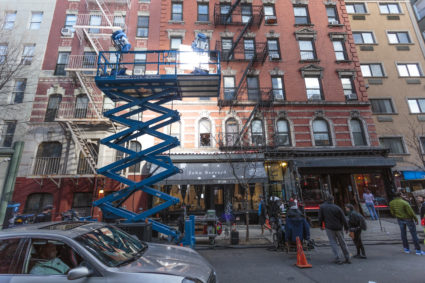
A federal panel reviewing President Donald Trump's plans to build a ballroom at the White House has set April 2…

Charles Yu, author of our February pick for the NewsHour-New York Times book club, recently answered questions submitted by readers on Facebook about his satirical novel, "Interior Chinatown".
Written as a teleplay, the book offers a darkly humorous commentary on racism and representation in the entertainment industry. You'll find a selection of his answers below and can watch senior correspondent Jeffrey Brown's interview with him here. These responses have been edited and condensed for clarity.
Walking a line is right. I felt like in order to execute this concept, I would have to really do it before showing it to anyone. So I wrote a good chunk of it, and then I did share it with my editor. And my editor, Tim O'Connell at Pantheon, actually had a lot of input, but only after I had already kind of fleshed out the concept.
It was painful at times. I like when a line I write makes me laugh or even smile, which doesn't happen that often. It's also a rare but welcome event when something I write actually makes me feel something, because then I think, 'Oh, I'm onto something here.' And that happened a few times in the book, particularly in the stories of Willis with either his parents or with Phoebe later on in the book.
I think there were parts of my experience as both a son and as a dad that I was kind of unlocking in the course of the story. It's funny — I spent a lot of time writing around things and then all of a sudden you start writing into sensitive areas and you think, 'Why wasn't I doing this the whole time?' Just get to the heart of the matter. But for whatever reason, it always takes that period of dancing around it first before I'm willing to dive into it.
Not having had a crystal ball, I didn't realize how timely it would become in 2020 specifically. But I think there's a more general timeliness. Black Lives Matter and a lot of the anti-immigrant sentiment that sort of erupted last year — those didn't happen in a vacuum. That didn't happen overnight. A lot of the writing of this book took place during the four years of the Trump administration, and I think that was always operating in my head as I was writing this book.
It's obviously horrifying to see some of these stories and videos that are circulating and hear about this huge surge in both sentiment and physical attacks on people. On the one hand, I feel this fear for vulnerable people and fear for people within communities that I am a part of. On the other hand, if anything, it's maybe an opportunity to have conversations or at least increase awareness that this type of sentiment still does exist.
I think sometimes it's easy to feel like either because of socio-economic success or maybe just a sense of complacency that things have gotten better, that it's all pretty much the way it's supposed to work — people come, they assimilate and they're generally accepted. Sadly, a lot of recent events have shown that underneath there is still a lot of either animosity or xenophobia. I don't want to make a silver lining out of it, but it is an occasion for conversation that needs to be had.
Sustain our coverage of culture, arts and literature.